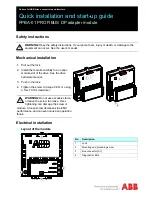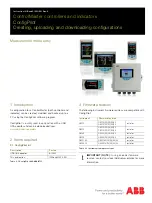
Running CAM programs 12.6
12
HEIDENHAIN | TNC 620 | ISO Programming User's Manual | 9/2016
469
12.6
Running CAM programs
If you create NC programs externally using a CAM system, you
should pay attention to the recommendations detailed below.
This will enable you to optimally use the powerful path control
of the TNC, and as a rule create better workpiece surfaces with
shorter machining times. Despite high machining speeds, the
TNC still achieves very high contour accuracy. The basis for this is
the real-time operating system HeROS 5 in conjunction with the
ADP
(Advanced Dynamic Prediction) function of the TNC 620. This
enables the TNC to also efficiently process NC programs with high
point densities.
From 3-D model to NC program
Here is a simplified description of the process for creating an NC
program from a CAD model:
CAD: Model creation
Construction departments prepare a 3-D model of the
workpiece to be machined. Ideally the 3-D model is designed for
the center of tolerance.
CAM: Path generation, tool compensation
The CAM programmer specifies the machining strategies for
the areas of the workpiece to be machined. The CAM system
uses the surfaces of the CAD model to calculate the paths
of the tool movements. These tool paths consist of individual
points calculated by the CAM system so that each surface
to be machined is approximated as nearly as possible while
considering chord errors and tolerances. This way, a machine-
neutral NC program is created, known as a CLDATA file (cutter
location data). A post processor generates a machine- and
control-specific NC program, which can be processed by the
CNC control. The post processor is adapted according to the
machine tool and the control. The post processor is the link
between the CAM system and the CNC control.
TNC: Motion control, tolerance monitoring,velocity profile
The TNC uses the points defined in the NC program to calculate
the motions of each machine axes as well as the required
velocity profiles. Powerful filter functions then process and
smooth the contour so that the TNC does not exceed the
maximum permissible path deviation.
Mechatronics: Feed control, drive technology, machine tool
The motions and velocity profiles calculated by the TNC are
realized as actual movements of the tool by the machine’s drive
system.
Summary of Contents for TNC 620 Programming Station
Page 4: ......
Page 5: ...Fundamentals ...
Page 28: ...Contents 28 HEIDENHAIN TNC 620 ISO Programming User s Manual 9 2016 ...
Page 57: ...1 First Steps with the TNC 620 ...
Page 77: ...2 Introduction ...
Page 110: ......
Page 111: ...3 Fundamentals file management ...
Page 166: ......
Page 167: ...4 Programming aids ...
Page 194: ......
Page 195: ...5 Tools ...
Page 234: ......
Page 235: ...6 Programming contours ...
Page 284: ......
Page 285: ...7 Data transfer from CAD files ...
Page 304: ......
Page 305: ...8 Subprograms and program section repeats ...
Page 323: ...9 Programming Q parameters ...
Page 384: ......
Page 385: ...10 Miscellaneous functions ...
Page 407: ...11 Special functions ...
Page 433: ...12 Multiple axis machining ...
Page 475: ...13 Pallet management ...
Page 480: ......
Page 481: ...14 Manual Operation and Setup ...
Page 549: ...15 Positioning with Manual Data Input ...
Page 554: ......
Page 555: ...16 Test Run and Program Run ...
Page 590: ......
Page 591: ...17 MOD Functions ...
Page 622: ......
Page 623: ...18 Tables and Overviews ...
















































